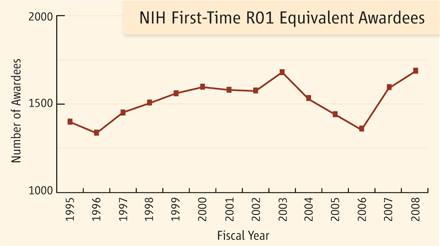|
|
|
|
|
|
|
News & Views item - November 2008 |
![]() Young Scientists Need a Bit of Affirmative Action. (November 7, 2008)
Young Scientists Need a Bit of Affirmative Action. (November 7, 2008)
The director of the National Institutes of Health, Elias Zerhouni, completed his six-year directorship last week. What Dr Zerhouni considered one of the most serious matters with which he had to contend was the overall aging of the agency's cohort of over 20,000 independent investigators. The mean age of first time awardees currently stands at 42.
After analysing the data on grant recipients Dr Zerhouni coupled the peer-review assessment to setting a minimum quota for the number of awards made to new investigators in 2007 and 2008.
Dr Zerhouni now has made this a formal NIH policy: "I think anybody who thinks this is not the number-one issue in American science probably doesn't understand the long-term issues... If we don't fund the pipeline now, we will pay for it 20 years from now," Zerhouni says.". The formal notice states NIH "intends to support new investigators at success rates comparable to those for established investigators submitting new applications."
The immediate result: -- In 2009 there will be at least 1650 awards to new investigators for R01s, NIH's most common research grant.
The graph below shows the immediate effect of Dr Zerhouni's efforts beginning in 2007.
 |
| NIH set a numerical target for grants to first-time investigators in 2007, the number of awardees grew. Their success rates matched those of established investigators seeking new grants. Credit: NIH |
Science reports that NIH will also fine-tune its policy to tilt it in favour of early-career scientists. The goal is to adjust for the recently discovered fact that only about 55% of investigators who receive their first NIH grants are at an early stage of their career. "The rest are scientists who had been funded by other agencies or came from NIH's intramural program or from Europe after being forced to retire there. The targets will favour "early stage investigators," defined as researchers within 10 years of finishing their Ph.D. or residency."
One of the reservations voiced is that the young first-timers will find difficulty in renewing support and will be lost from the field, but the data suggest that "so far it seems that first-time investigators do just as well as established investigators who are renewing a new grant".